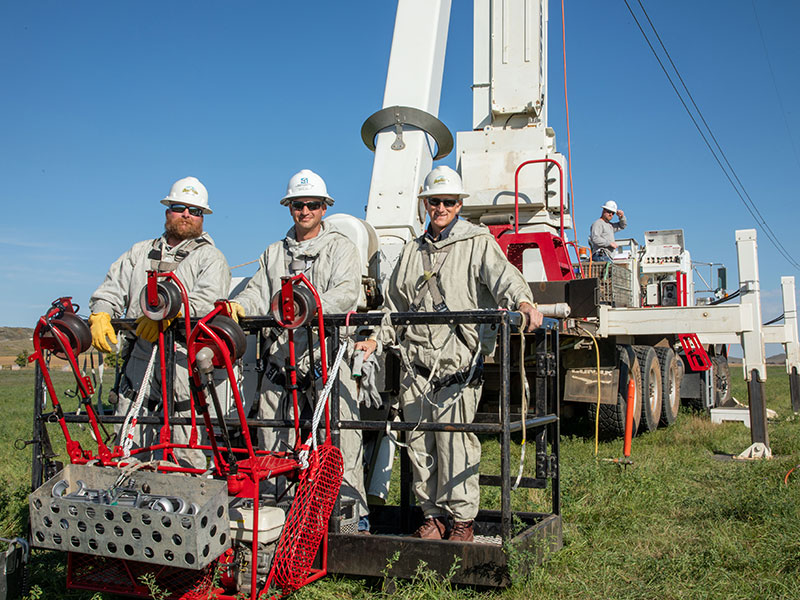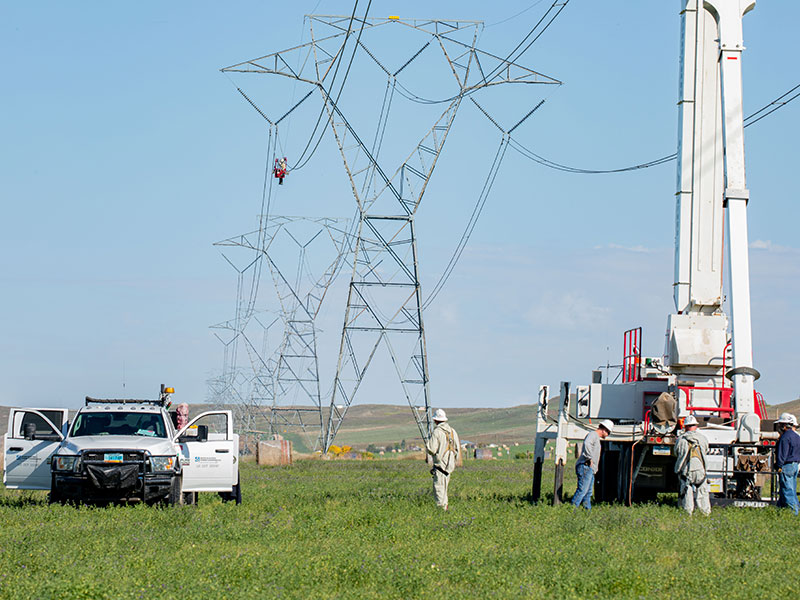- Products
- About
- Responsibility
- Environment
- News
- Contact us
- Careers
-

Like cars and houses, transmission lines require routine maintenance to keep them in good working order. But when was the last time your electric co-op sent you a notice that your electricity would be turned off so lineworkers could perform that maintenance? If you can’t remember, it’s not because maintenance doesn’t happen – it’s because much of it is done while the lines are still energized.
Basin Electric’s high-voltage transmission lines carry up to 345,000 volts of electricity. The thought of working on lines with that much electricity flowing through them is impressive — even more so when one compares that to the time they put their tongue on a nine-volt battery when they were a kid.
While lineworkers are heroes in the electric industry, they are still human, so performing work on energized lines requires special tools, a protective suit, and a whole lot of training. All this is done so they can safely do the work that allows us to light our homes and charge our phones without giving a second thought to where our electricity is coming from.
Every spring and fall, Basin Electric’s Transmission System Maintenance (TSM) crews from across the co-op’s service area get together for live line training, a week-long, hands-on training where lineworkers learn and refine the techniques necessary to safely perform hot stick (insulated fiberglass tools) and barehand work on energized power lines. All Basin Electric lineworkers, no matter if they’ve been on the job for a week or are approaching retirement, are required to participate.
“It’s a great way for crews to get together because they’re all so spread out,” says Vince Smith, Basin Electric transmission line superintendent. “There are 10 crews from eight outpost locations spread across four states that gather for this training. Some of the crews work on wood structures and some on steel structures, and we have people who have been doing this for 25 years and others who have never held a hot stick or done barehand work. It’s a chance for newer linemen to learn from our veteran linemen and a way for longtime linemen to learn new and sometimes more efficient ways of doing things. These trainings are good for everyone and essential for the safety of our linemen.”
Every day of the training begins with a safety briefing where the crews go over the tasks they’ll complete that day. They then travel out to the job site where they set up and have a more thorough safety meeting. The lead lineman calls into dispatch to let them know what crews are doing and where, so they can put appropriate safety measures in place. They test the trucks and go through the procedures they’ll follow for the tasks they’ll perform. Then they do the work – whether it’s changing out the spacers that help prevent galloping transmission lines, replacing insulators that keep the electrons on the lines, or even practicing how to rescue an injured lineman off the structures.
“Everything we do out here is for safety,” Smith says. “Getting familiar with the techniques and proper tooling, training new linemen, and refining skills for those who are more seasoned. We strive to do everything we can when power lines are energized because that means reliability for our members.”

“Training like this is a good thing for new guys like me,” says Carter Scanson, a journeyman-lineman at Basin Electric’s Menoken, North Dakota, TSM outpost. “I’ve done hot line work before, but it was on 7,200 volts, and the line we’re working on today is 345,000 volts so it’s a lot different. It’s nice to get everyone together and have the more experienced guys show us the correct and safest way to do things.”
Scanson says one of the most important things he’s learned is the importance of communication. “You’ve got to constantly be talking,” he says. “Everyone has to know your next step. If you come out and watch us work, you’ll constantly hear us say, ‘I’m doing this now, I’m doing that now,’ and the others will always respond, saying ‘sounds good,’ or something like that so we know they heard us. This is dangerous work and being on the same page elevates the safety a lot.”
Casey Blotske, lead lineman at Basin Electric’s Logan, North Dakota, TSM outpost says the camaraderie they build is another essential part of the training. “We get to work with each other, learn from each other, and develop the relationships that are essential in this type of career,” he says. “It helps us build trust in each other, which is important because everyone’s lives are in each other’s hands at any given moment. We are more than co-workers, it’s a brotherhood.”
Blotske says the training helps cross-train employees on the different types of tools and structures because there are times when they need to help out in other areas, and then they can just jump right in.
“The best days (of my job) are coming to work on days like today,” Blotske says while looking up at the other linemen as they are lifted in a bucket truck, arms raised holding the rod that will create a bond with the energized line, protecting them from 345 kilovolts of electricity. “The worst days are when a line falls down and you know you ain’t going home for a day, or two, or a week. Last summer I was away from home between three and five weeks because of storms — but I live out in a rural area and I know what it’s like to lose power. And I know when the power goes out, I’m gonna get called out to work. But that’s the job — no one wants to be without power and it’s our job to make sure they don’t have to.”
Dakota Gasification Company
Headquarters:
1717 East Interstate Avenue | Bismarck, ND 58503-0564 USA
701.223.0441 | 1.800.242.2372
Great Plains Synfuels Plant
420 County Road 26
Beulah, ND 58523-9400 USA
701-873-2100
A subsidiary of:
Basin Electric wants all interested and qualified candidates to apply for employment opportunities. If you are an applicant with a disability who is unable to use our online tools to search and apply for jobs, or who needs other assistance or accommodations, please contact us at 701-223-0441. Please indicate the specifics of the assistance needed or provide your contact information, and a Basin Electric Human Resources representative will contact you. Basin Electric is an Equal Employment Opportunity Employer regarding race, color, religion, sex, sexual orientation, gender identity, national origin, disability, and veterans status.